Playing a steampunk RPG with an Italian speaker on a Russian server
Steam Hammer is a crafting-heavy survival RPG that gets better with Google Translate.
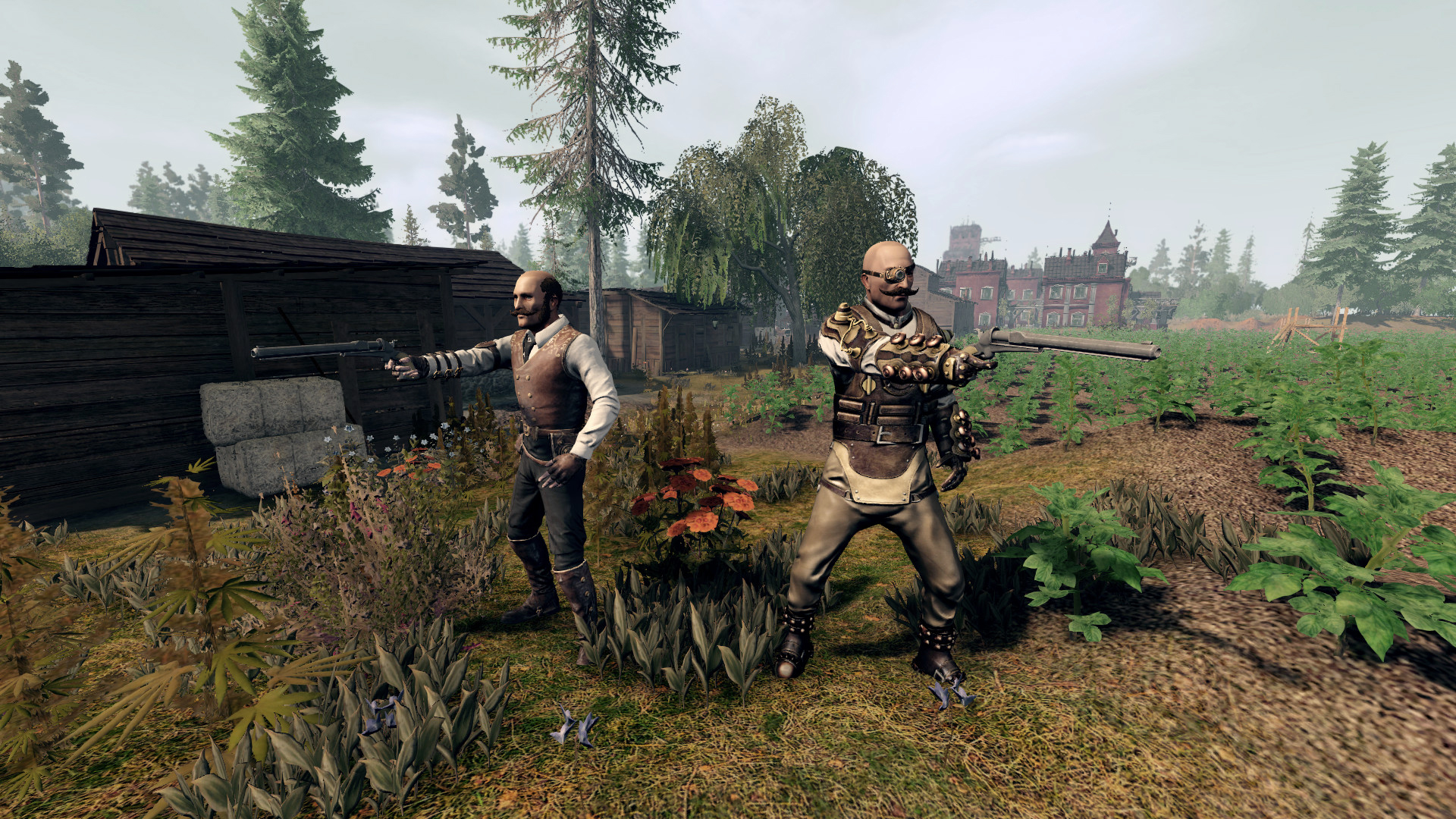
“Domani facciamo i motori per volare,” says my new friend. His messages are the only non-Russian text in the chat box, so I know it’s a message for me. I copy the text into Google Translate. “Tomorrow we make the engines to fly.” I know what he means.
I first encountered Nino in Steam Hammer, an open-world steampunk RPG similar to Life is Feudal, before we actually ran into each other. I wandered onto a plot of land and an automated warning message yelled at me. I’d invaded Nino’s land, it proclaimed, and Nino was going to kill me. Being new to Steam Hammer, I wasn’t sure how violent it was, or what the etiquette was, or if some alarm system was going to shoot poison darts at me. I stole some oranges from Nino’s trees and bolted.
About half-a-mile away I found an abandoned hovel and several machines for smithing and woodworking, all operational. And then another small camp, nearer to a hillside rich with iron and copper. These structures weren’t claimed, so I declared them my home and rooted through baskets, pulling out clay and copper ore—slightly worried that whoever built these camps, maybe Nino, would sneak up behind me and whack me on the head for taking their stuff.
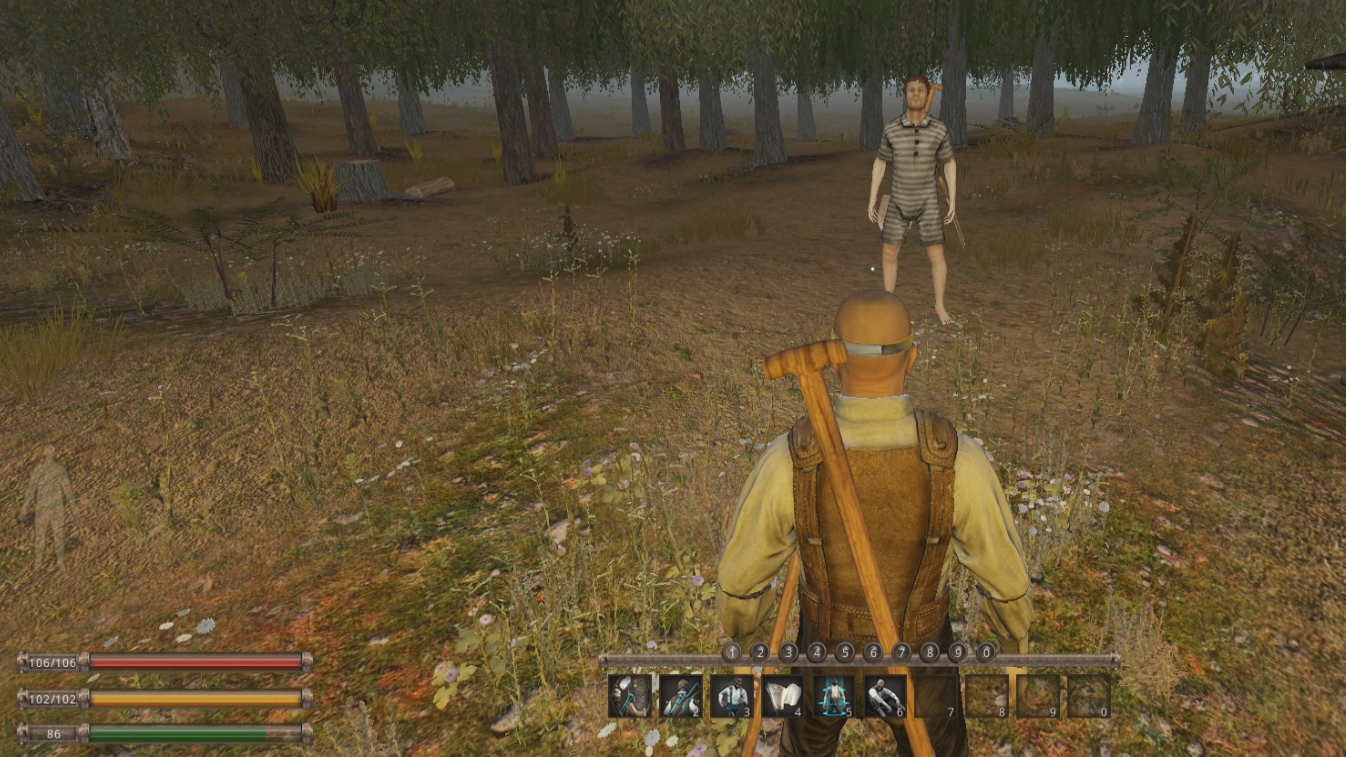
Non parlo italiano
I made a few clay molds and fashioned copper tools, and got to work adding to the small camps. And then I heard footsteps.
Around half an hour passed, and despite the Russian chatter scrolling by in the global chat, no one bothered me. I made a few clay molds and fashioned copper tools, and got to work adding to the small camps. And then I heard footsteps. I turned, and there was Nino, standing ten feet away, staring at me. I froze. In two hours of playing on multiple servers, this was the first time I’d seen another player, and it just happened to be the player whose oranges I ransacked minutes ago.
When I looked again at the global chat log, I saw Nino, but to my relief he wasn’t looking for a fight. Though I don’t speak Italian I could tell he was asking if anyone did. “Нет” said one player, saying no. “Rus.”
I had started Steam Hammer on an American server, but after meeting nobody and aimlessly wandering into the ocean and dying—apparently just dipping your head underwater is deadly—I got bored and frustrated and left. I spotted a much more populated Russian server and decided, ping be damned, to give it another go. I was quiet, though, because I felt bad about crashing their party with zero comprehension of Russian. But Nino was in the same place.
“Ciao,” I said. “Non parlo italiano ma posso tradurre.”
The biggest gaming news, reviews and hardware deals
Keep up to date with the most important stories and the best deals, as picked by the PC Gamer team.
Hello. I don’t speak Italian but I can translate. (Or something close enough to that to be understood.)
“Accetta,” said Nino. “Prendi.”
Ax. Take.
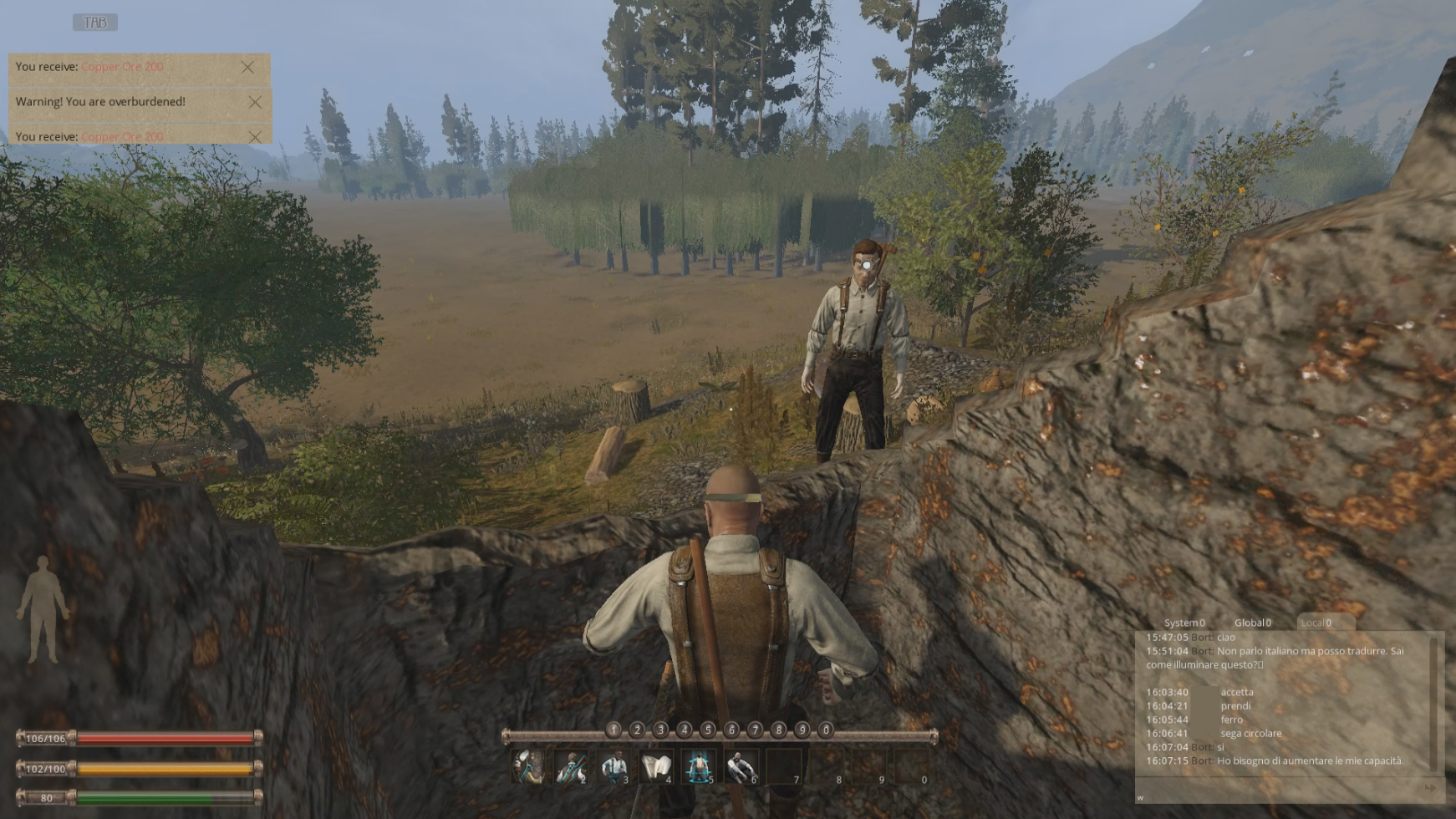
It was at least 30 minutes before I understood that Nino wanted me to return to the plot of land I’d passed through earlier so he could add me to his guild.
This is how most of my conversations with Nino went at first. I would ask some long question in auto-translated, probably unintelligible Italian, and Nino would say something like “circular saw” or “what are you doing?”
It was at least 30 minutes before I understood that Nino wanted me to return to the plot of land I’d passed through earlier so he could add me to his guild (which I’m pretty sure is just me and Nino), and that our goal was to build a sawmill. Nino had started constructing one, but it was missing a blade.
Steam Hammer is in Early Access on Steam, and some features are barebones. I couldn’t find a guild chat, for instance, so I continued using the local chat to talk to Nino. I also couldn’t see Nino on the map or mark locations, so if I got lost, I just had to wander until I found my way back or teleport ‘home’—which only worked half the time.
Back on the American server, I’d been killed by a wild hog beast who clipped through me while I swung at the air above it. I don't get the sense that combat is very far into development. But after meeting Nino, I didn’t encounter any other such dangers in Steam Hammer. It has ‘survival elements,’ which just means that you need to eat, and if you die, you lose your stuff and a bunch of skill points. But it isn’t constantly trying to kill you like many survival games. Eating helps your stamina recharge and some foods boost skill leveling, but I was able to get by fine on oranges, and I don’t even know what happens when the food meter runs out because I never came close to that.
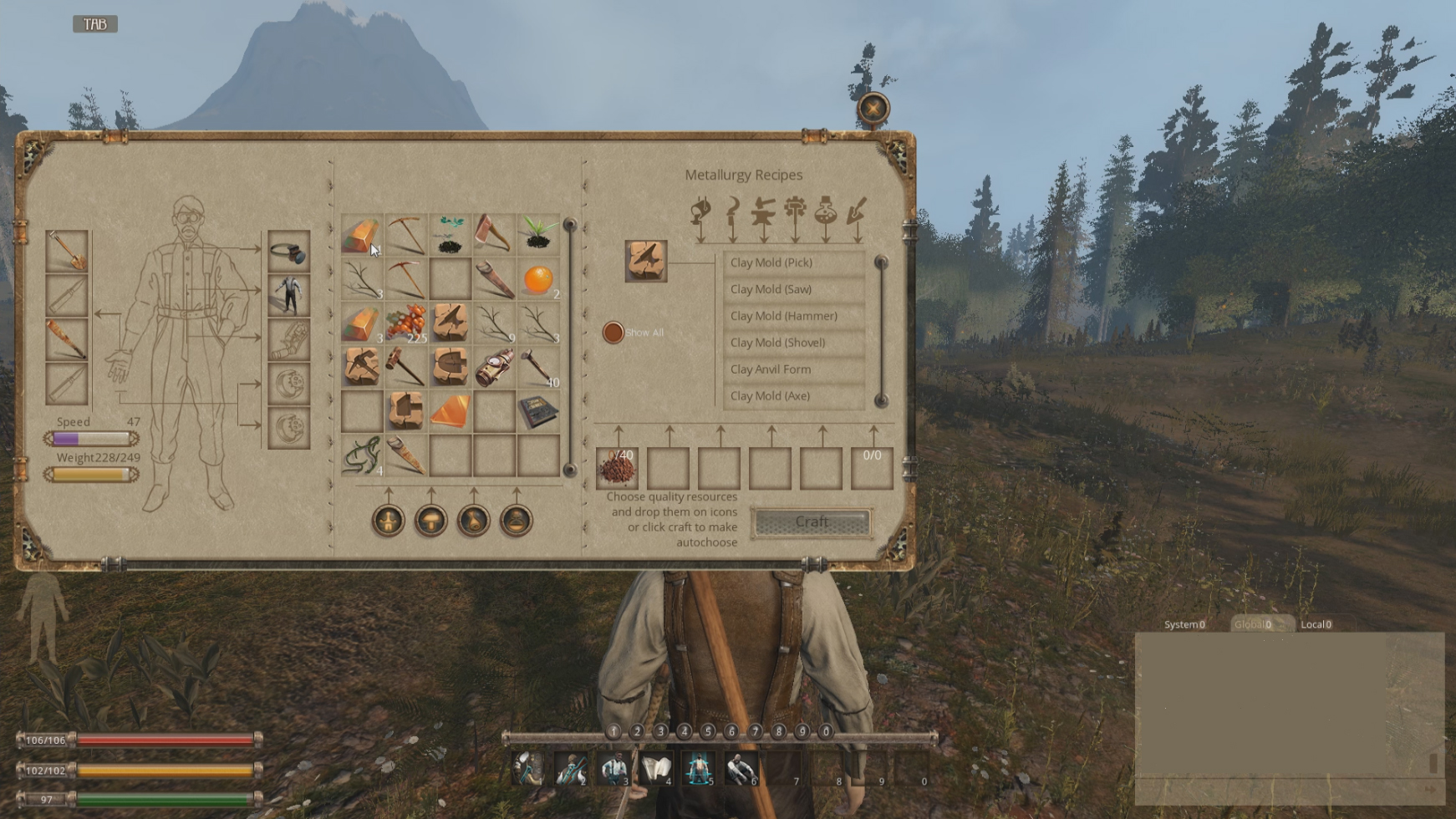
The bulk of Steam Hammer is about building and maintaining tools and structures, and slowly leveling skills through use. The more trees I chop down, the more wooden beams and boards I make, the stronger my construction skill becomes, unlocking new buildings and tools to make. The more I plant trees, scavenge for food and seeds, and work the land, the better my farming skill becomes. It’s a long process, and follows the progression of other survival games: First, gather scrap metal and build campfires and sleeping bags out of sticks and plant fibers. Then, smelt copper in the fire. Then build a smelter. Use it to make better tools, and new workbenches, and eventually mansions, guns, and airships—“the engines to fly.”
The UI is not great, but workable. Right click on a tree, a bush, or a square of land to see a long list of actions: plant a tree, dig a hole, search for alchemy ingredients, and so on. Any action can be set as the default, which happens with a left click, which is essential, especially when trying to level the land. This is the most frustrating part of Steam Hammer’s light terraforming system: buildings must be built on a perfectly level plot, and creating such a plot requires a long process of smoothing grid squares one at a time, checking the build menu to see that no, they still aren’t level, and going back to click around with the smooth action some more.
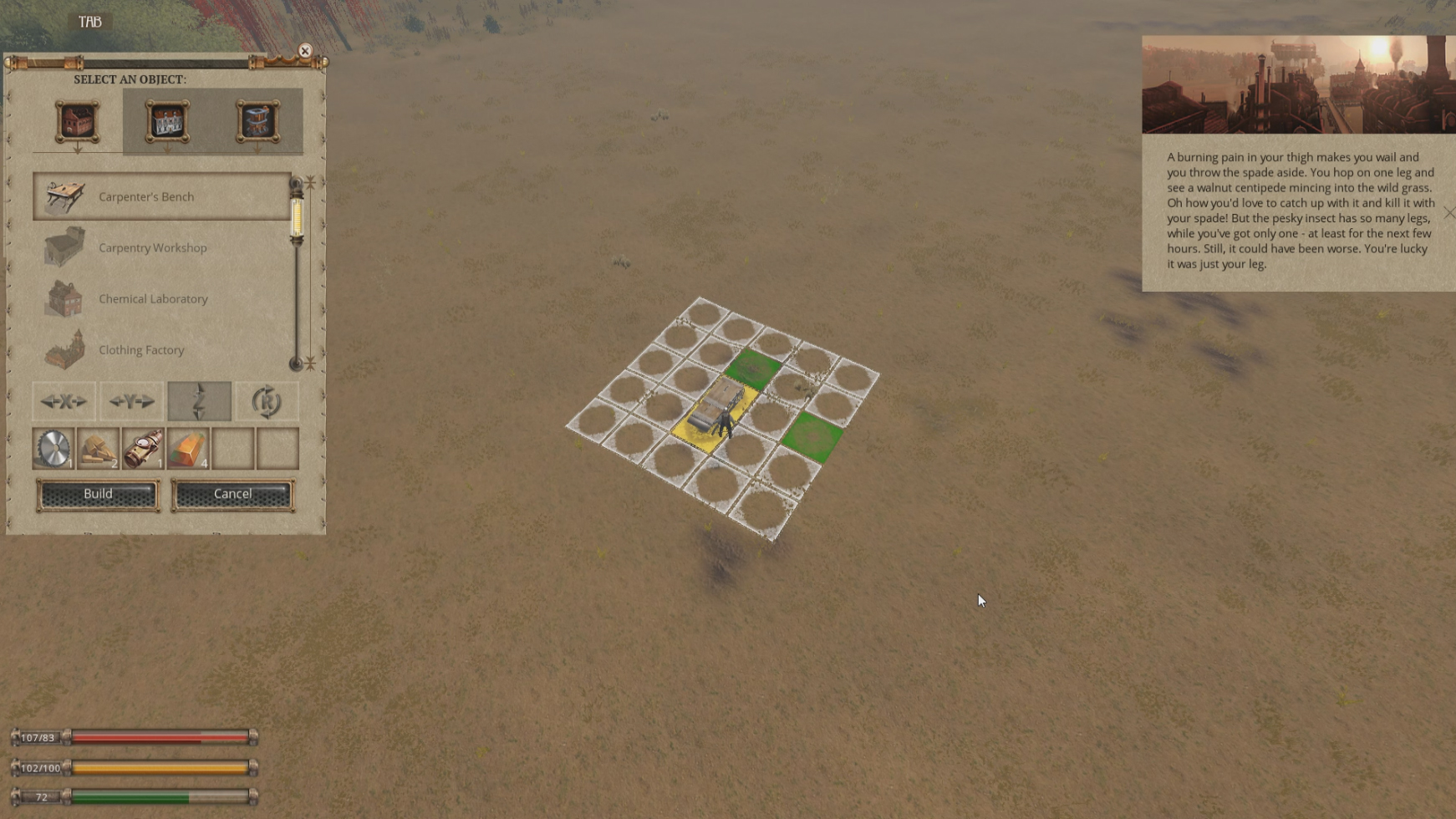
Ho fatto una pistola
Our conversations take a while with me alt-tabbing back and forth between the game window and Google Translate.
“Voglio costruire una fattoria,” I tell Nino, after we’ve established the guild and started communicating more clearly. I want to build a farm. I have no idea what the farm structure will do for us—it just looks like a big barn—but I set out to play Steam Hammer as a kindly farmer and I’m sticking with it. I’m happy that Nino likes the idea, though neither of us have the skills needed, so we both set about digging holes in the nearby hills to collect rocks and ores, smelting and making new things.
“Ho fatto una pistola,” says Nino. We stand next to a basket, each of us viewing the contents. Nino puts a pistol into the basket. I add my pistol. It’s an economical way to verify that we understand each other: both that we intend to share everything, and that “I made a pistol” isn’t a threat. We communicate nonverbally in other ways, as well. Steam Hammer doesn’t have many emotes at the moment, but shaking the camera up and down to ‘nod’ and then running in the other direction means ‘follow me.’ Using the ‘rest’ ability to sit down invites the other to do so, and indicates that they should look at the chat—our conversations take a while with me alt-tabbing back and forth between the game window and Google Translate.
It's a slight hassle, but it's a meta-challenge that I'm enjoying. When I say something and it's clear that it made sense, and I get a clear response, I hop up and down and we get to work. And I now know how to say "I made a pistol" in Italian, if that ever comes in handy. Meanwhile, there are several Russian players doing their own thing, and at some point we'll run into them and I'll need to open even more Chrome tabs to keep up.
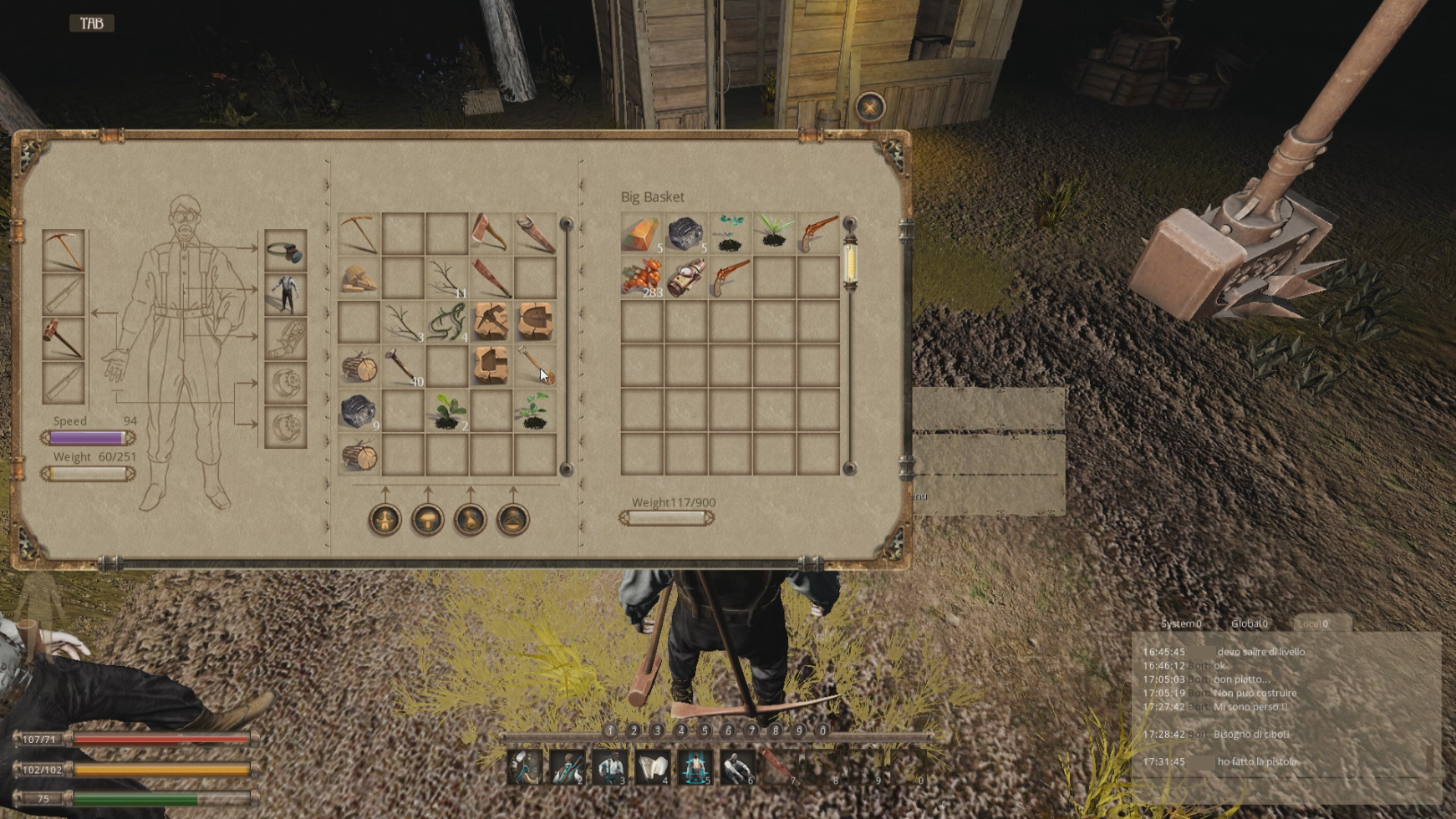
At around 7 pm, I explain to Nino that I’m leaving to eat dinner, and that I’ll come back to build the farm. When I return, Nino is gone—it’s late in Italy, after 1 am, so I’m not surprised. I putter around, learning more about the alchemy system, which I’d ignored before. To gather ingredients, I have to click a piece of land to search, and then harvest ‘herbs’ that pop up around me. It's mindless but satisfying, a little slot machine that might give me what I need, or might give me something I've never heard of. The skill levels up quickly and I’m soon overburdened by arcane powders and minerals. I build a new basket to store them in, figuring Nino will get some use out of my scavenging.
I want to leave more than that, though, so I dedicate myself to building that farm, and a nice streetlight for our settlement. Steam Hammer doesn’t make its numbers visible, so earning a new level is always a surprise. It’s a nice surprise, but the lack of information frustrates when trying to reach a goal. I start grinding: chopping down trees, leveling land, making board after board. The levels creep by slowly and it seems like it’ll take hours to hit Construction level 45, which I need to build a door for my barn. I try a new tactic. I give up on leveling through repetition and start making more advanced things—a repair kit to fix my sawmill, for instance, which requires a long run to the beach for sand and water to make mortar with. It works. Doing more complex tasks accelerates my leveling and I’m quickly qualified in door making.
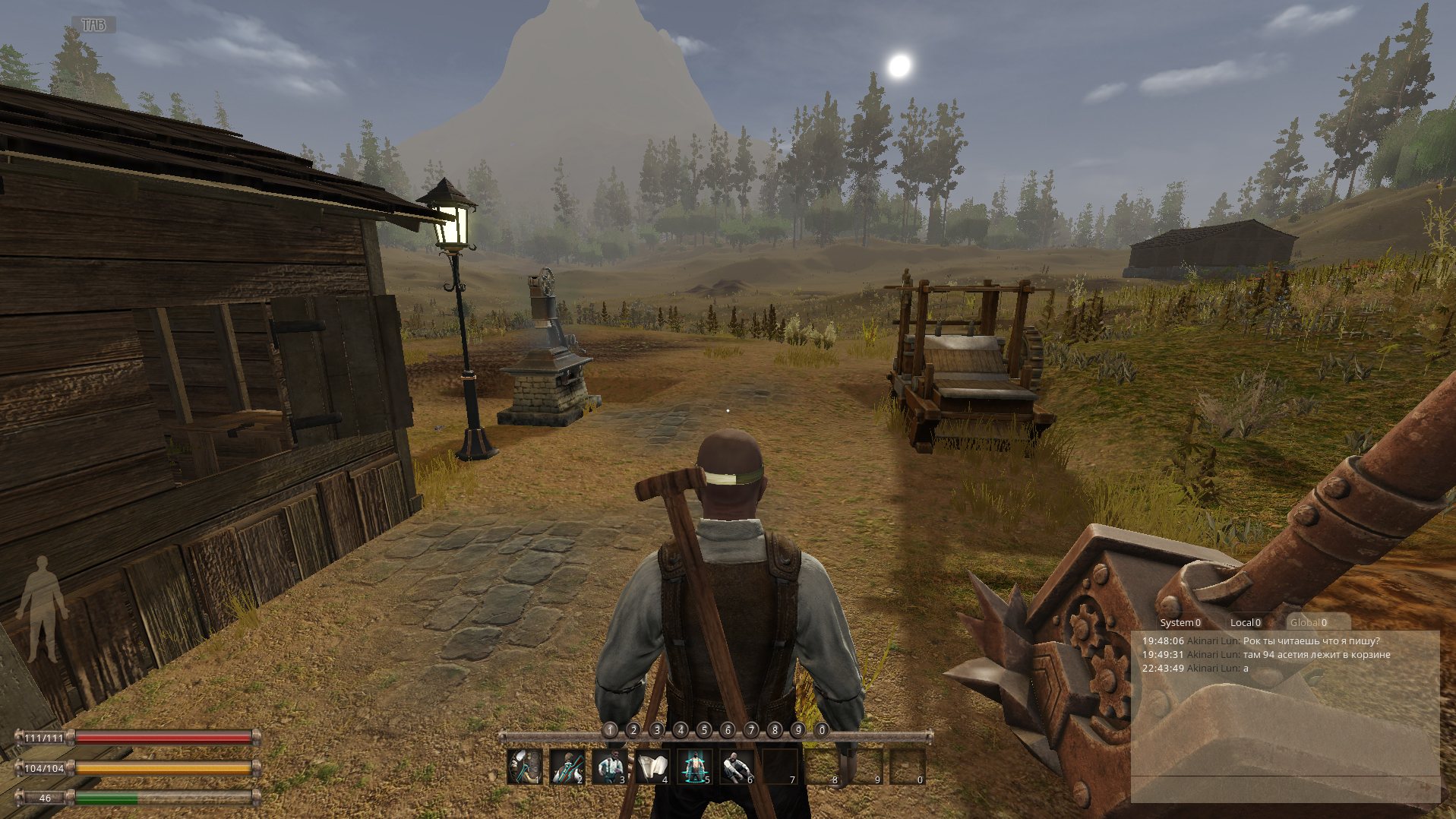
The negative Steam reviews aren’t wrong: it’s buggy, the framerate is unstable, and, yeah, it’s a lot like Life is Feudal.
‘Quickly’ is a relative term, of course. At midnight—I ate dinner at my desk, in the end—I had finally done it. I built a barn, the purpose of which I’m still unsure of, and which I accidentally placed backwards, so that the door is facing away from our main settlement. I wanted to stick around, to plow the fields and plant onions and potatoes and carrots to really make my farm look like a farm, but my better judgement logged me out for the night.
It’s easy to bounce off a game like Steam Hammer. The negative Steam reviews aren’t wrong: it’s buggy, the framerate is unstable, and, yeah, it’s a lot like Life is Feudal but without the benefit of the last couple years of Life is Feudal’s development. There are few players online at any given time, which is why I wound up on a Russian server—though, surprisingly, I rarely had connection problems.
If I had played for two hours instead of nine, I’d have come away with nothing positive to say. But sandbox RPGs like Steam Hammer are more than the sum of their bugs. They aren’t any fun without effort—without learning the arcane systems and finicky UIs, interacting with other players (whether or not you speak the same language), setting your own goals, and building things for the sake of making something nice.
Steam Hammer is early in Early Access, so if you’re keen on building airships but want a complete and stable platform with plenty of players, there are lots of reasons to wait. But if you don’t, and you see a backwards-facing farm on ‘[RU] Game server MOW 31,’ feel free to stop by and I’m sure Nino will invite you to join us. (Please don’t shoot at us, I haven’t made any bullets yet and our pistols are still sitting in a basket.)

Tyler grew up in Silicon Valley during the '80s and '90s, playing games like Zork and Arkanoid on early PCs. He was later captivated by Myst, SimCity, Civilization, Command & Conquer, all the shooters they call "boomer shooters" now, and PS1 classic Bushido Blade (that's right: he had Bleem!). Tyler joined PC Gamer in 2011, and today he's focused on the site's news coverage. His hobbies include amateur boxing and adding to his 1,200-plus hours in Rocket League.

